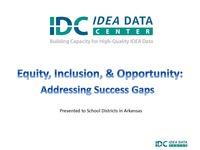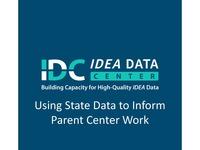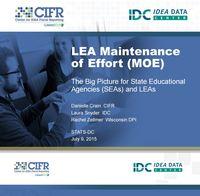Site Search
Results 8 - 14 of 158
Format: Presentations
Moving From Theory to Action - NebraskaThis state presentation describes Nebraska's SIMR, Theory of Action, and approach to implementation.
Format: Presentations
National, State and Local Inclusion Data: Accessing and Using Data to Increase Inclusive OpportunitiesThe presentation focused on current national data on inclusive settings for children, ages three to five. Presenters drilled down to state examples of how state share data with local programs and how locals use that data for program improvement. Presenters discussed potential improvement strategies based on data available to state and local programs. Presentation objectives were to: provide an overview of inclusion and Educational Environments 618 and Indicator 6 data, share state and local reporting, and discuss use of data to improve inclusion.
Format: Presentations
Equity, Inclusion, & Opportunity: Addressing Success GapsThis presentation introduced the audience of local education agency personnel to new tools, the Equity, Inclusion, and Opportunity: How to Address Success Gaps Rubric and the Equity, Inclusion and Opportunity: How to Address Success Gaps White Paper. The rubric and white paper were developed by a group of OSEP-funded technical assistance providers, with input from states and other experts. The Equity, Inclusion, and Opportunity: How to Address Success Gaps tools provide a process for reducing the differences in school success among subgroups of students by providing a structure for districts or schools to examine their current practices and identify areas for improvement.
Format: Presentations
Using State Data to Inform Parent Center WorkThe purpose of this presentation was to introduce PTI and CPRC directors and staff to the IDEA data collected and reported by state education agencies and discuss how these data can be used to inform many of the fourteen priority topics for the PTI/CPRC network. These priorities were identified in the most recent OSEP requests for proposals for PTI and CPRC funding.
Format: Presentations
IDEA and FERPA - Understanding the BasicsThis presentation informed participants of the privacy provisions under IDEA Part C, IDEA Part B, and FERPA. It covered the basics surrounding the legal requirements related to the protection of PII about children with disabilities and where to go for help with questions about privacy. The audience for the presentation included administrators and practitioners who are concerned with providing services for children and youth while maintaining the privacy of the children and youth they are serving.
Format: Presentations
LEA Maintenance of Effort (MOE)—The Big Picture for State Educational Agencies (SEAs) and LEAsThe IDEA requires LEAs to annually maintain their local or state and local expenditures for the education of children with disabilities. SEAs are required to ensure that LEAs are in compliance with MOE. The CIFR and the IDC presented the basics of LEA MOE options to meet the MOE requirement, the allowed exceptions to reduce MOE, consequences of MOE noncompliance, and fiscal and program requirements necessary to determine the LEA MOE eligibility and compliance. A representative of the Wisconsin Department of Public Instruction shared the state's success story and processes.
Format: Presentations
The Role of IDEA Data Managers in LA/SEA Data Governance ProgramsData governance is a critical function for organizing and exerting proper influence over data management decisions. During the last several years, many LAs and SEAs have defined and adopted data governance programs. This session explored the role of IDEA data managers as data stewards in SEA data governance programs.








